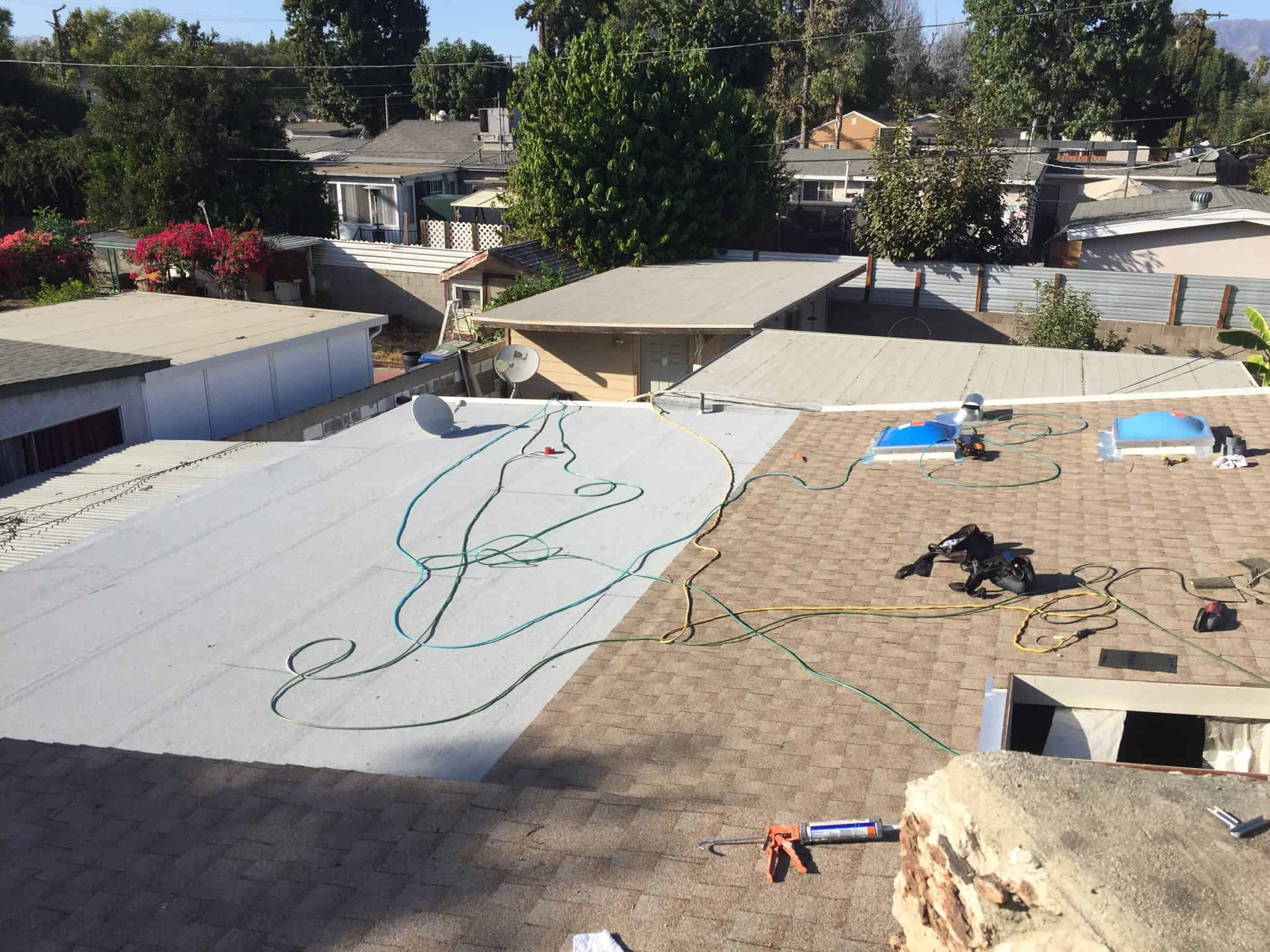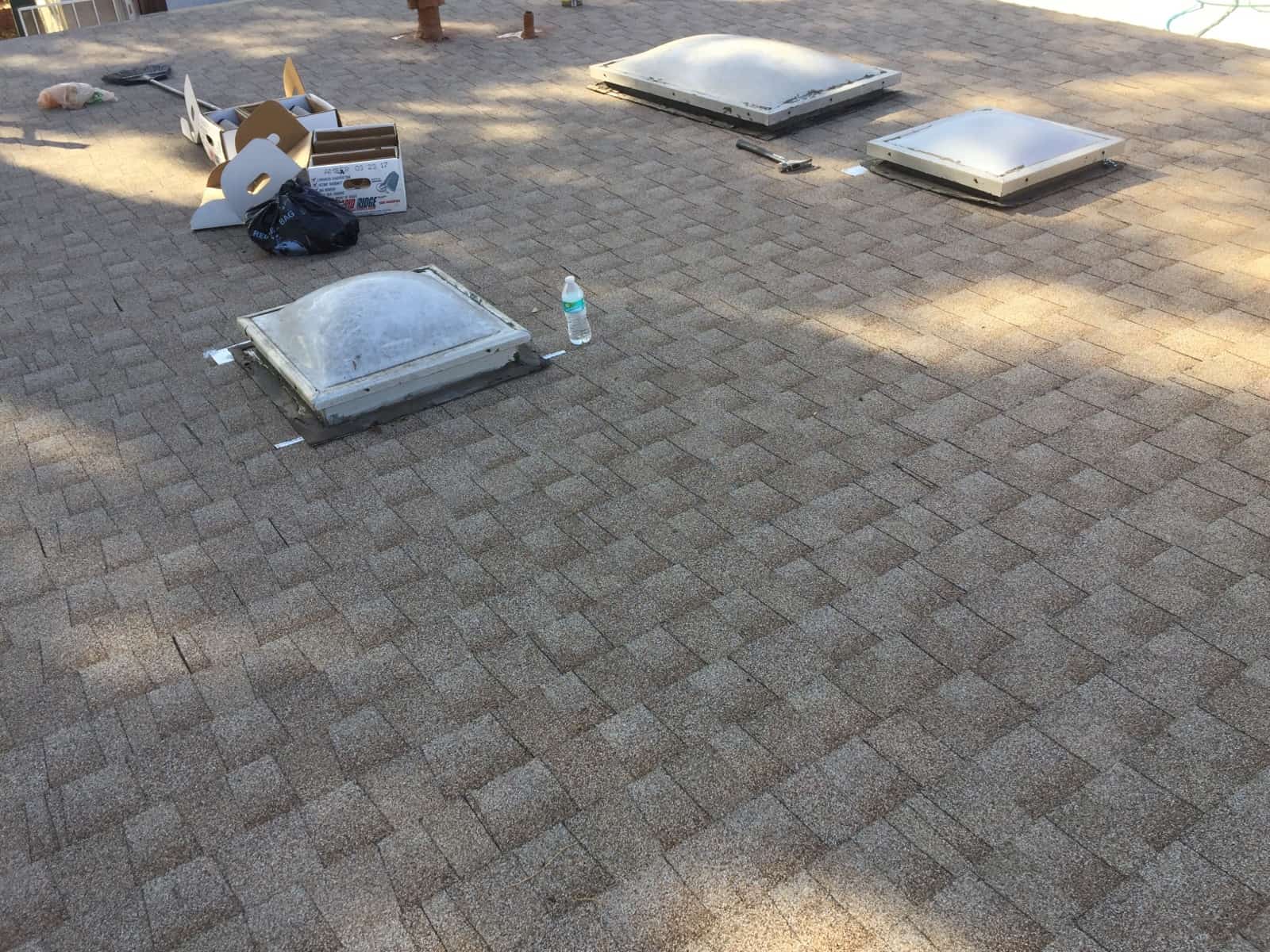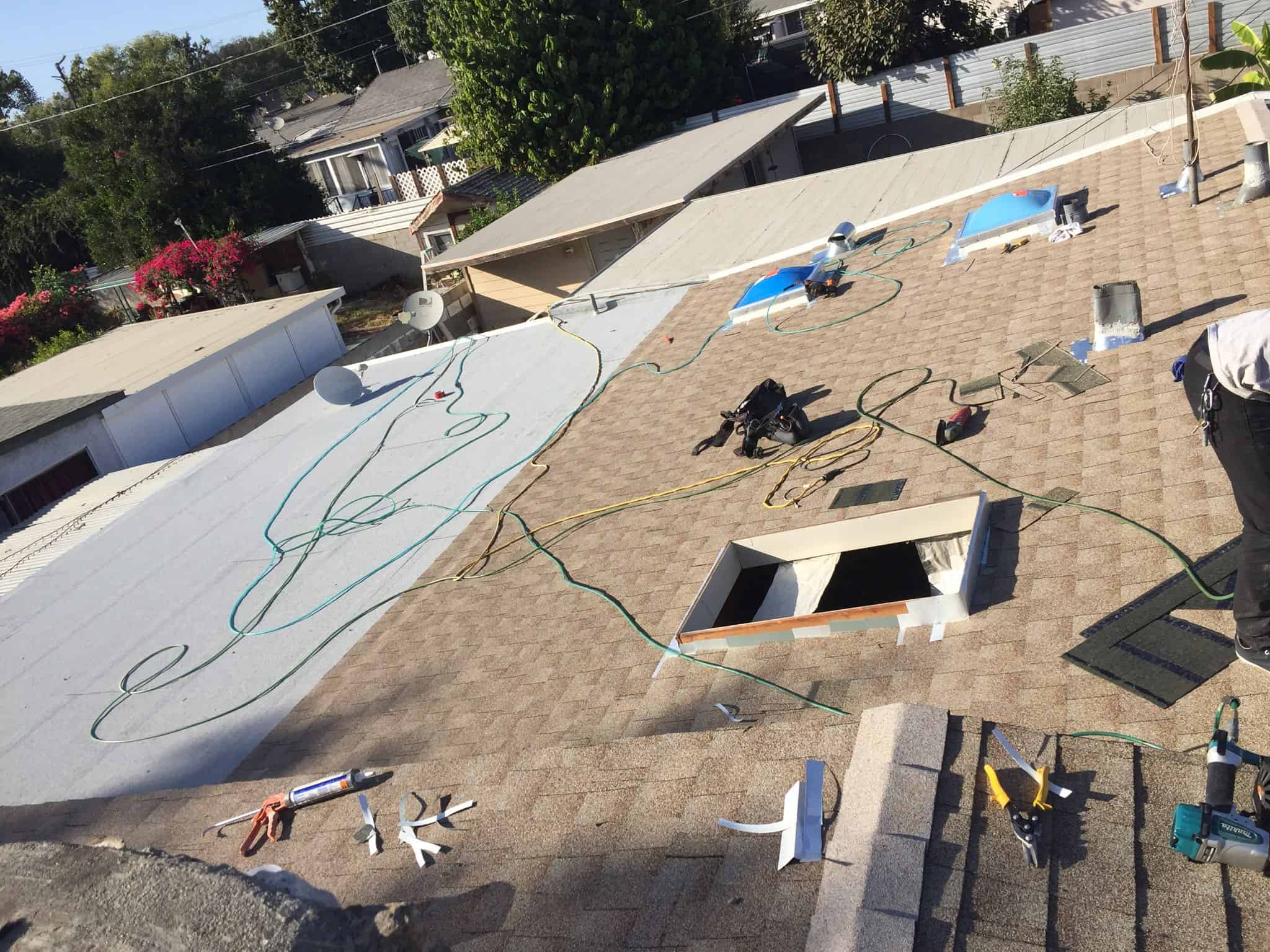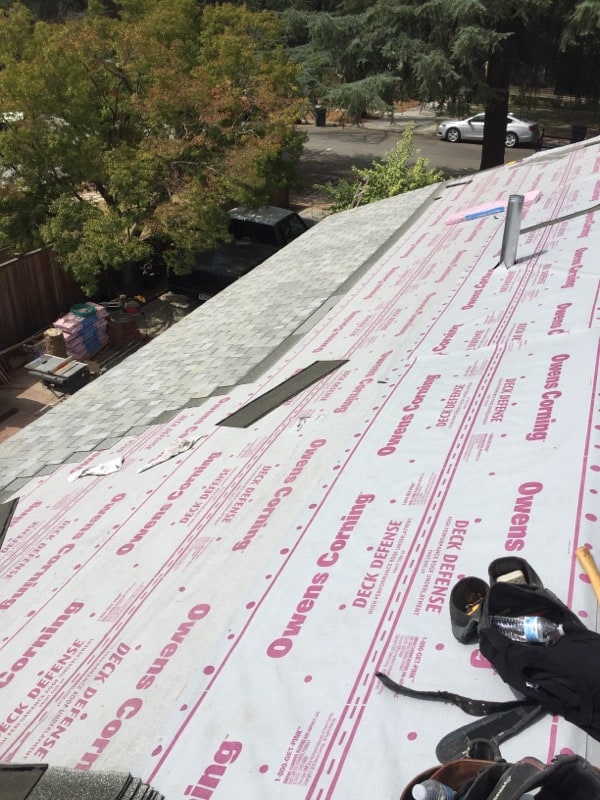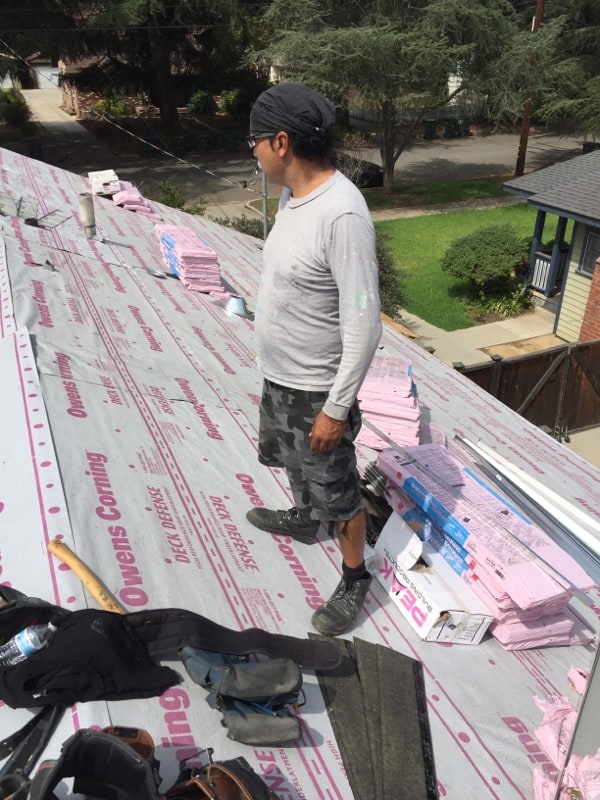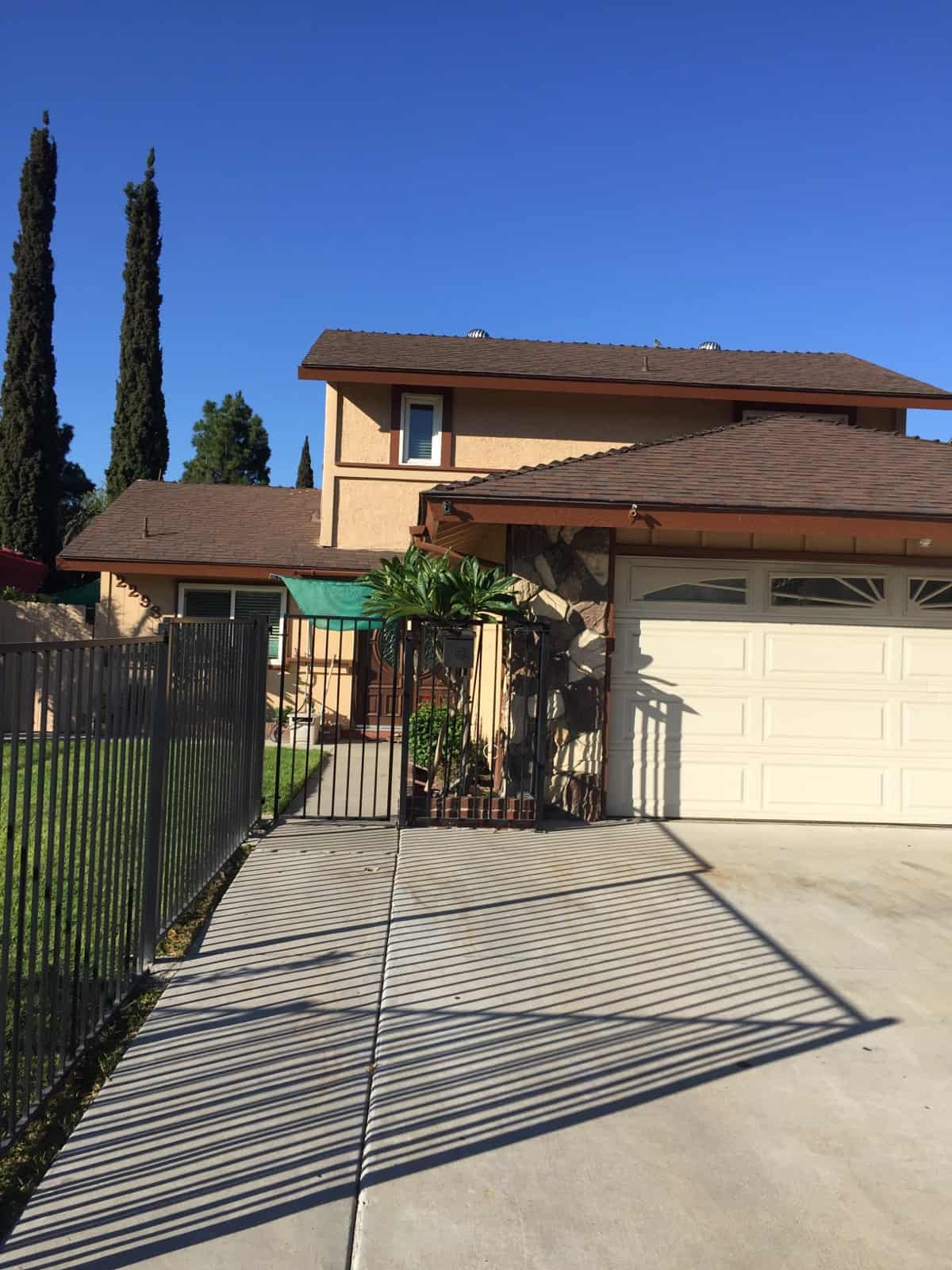Roofing Contractor
A flat roof is a roof which is almost level in contrast to the many types of sloped roofs. The slope of a roof is properly known as its pitch and flat roofs have up to approximately 10°. Flat roofs are an ancient form mostly used in arid climates and allow the roof space to be used as a living space or a living roof. it is also more cheap to build the structure of the flat roof than pitch roof There for it is more common.
- Ethylene Propylene Diene Monomer (EPDM) Rubber Roofing is a synthetic rubber most commonly used in single-ply roofing because it is readily available and simple to apply. Seaming and detailing has evolved over the years and is fast, simple and reliable with many membranes including factory applied tape, resulting in a faster installation. It is a low-cost membrane, but when properly applied in appropriate places, its warranted life-span has reached 30 years and its expected lifespan has reached 50 years.
- Torch Down Roofing (sometimes referred to as “torch on” roofing) is so named because it requires an open-flame propane torch. In this installation method, sheets of modified bitumen are rolled out onto the roof, and a roofing professional uses a hand-held propane torch to heat the material and adhere it to the surface. Once the layers reach the right temperature, seams are melted together to create a waterproof seal.
That method is more common It is divided into several thickness There is a 2 millimeter And 4.5 millimeter.
The 4.5 Millimeter divided into two sections one is a regular and one in cool roof which is actually giving a better life time and also energy efficient. - Thermoplastic Polyolefin (TPO) Single-Ply Roofing. This roofing material can be fully adhered, mechanically fastened, or ballasted. TPO seam strengths are reported to be three to four times higher than EPDM roofing systems. This is a popular choice for "Green" building as there are no plasticizers added and TPO does not degrade under UV radiation. It is available in white, grey, and black. Using white roof material helps reduce the "heat island effect" and solar heat gain in the building. Usually lasts between 15 years to 20 years..
- Polyvinyl Chloride (PVC) Membrane Roofing is also known as vinyl roofing. Vinyl is derived from two simple ingredients: fossil fuel and salt. Petroleum or natural gas is processed to make ethylene, and salt is subjected to electrolysis to separate out the natural element chlorine. Ethylene and chlorine are combined to produce ethylene dichloride (EDC), which is further processed into a gas called vinyl chloride monomer (VCM). In the next step, known as polymerization, the VCM molecule forms chains, converting the gas into a fine, white powder – vinyl resin – which becomes the basis for the final process, compounding. In compounding, vinyl resin may be blended with additives such as stabilizers for durability, plasticizers for flexibility and pigments for color.
Thermoplastic is heat-welded seams form a permanent, watertight bond that is stronger than the membrane itself. PVC resin is modified with plasticizers and UV stabilizers, and reinforced with fiberglass non-woven mats or polyester woven scrims, for use as a flexible roofing membrane. PVC is, however, subject to plasticizer migration. (a process by which the plasticizers migrate out of the sheet causing it to become brittle.) Thus, a thicker membrane has a larger reservoir of plasticizer to maintain flexibility over its lifespan. PVC is often blended with other polymers to add to the performance capabilities of the original PVC formulation, such as KEE – Keytone Ethylene Ester. Such blends are referred to as either a CPA – Copolymer Alloy or a TPA – Tripolymer Alloy.
Vinyl roofs provide an energy-efficient roofing option due to their inherently light coloring. While the surface of a black roof can experience a temperature increase of as much as 90 degrees under the heat of the full sun, a white reflective roof typically
increases only 5–14 degrees Celsius (10–25 degrees Fahrenheit). This type of roof could last over 20 years.
Is Silicone the Last Roof You’ll Ever Need?
Silicone is quickly becoming the go to material in the flat roof coatings market. Its benefits range from leak-free protection to improved aesthetic appeal of the roof to improved sustainability.
When a silicone roof coating is installed, it is there for performance. These roofs are also highly sustainable, and could quite literally be the last roofing substrate you ever need with only a recoating every 10-15 years. Check out this video that illustrates the ease of application of silicone flat roof coatings: Roof Coating Restoration.
The Benefits of Silicone as a Flat Roof Coating
Let’s look at the benefits of silicone as a flat roof coating. What does it do that no other material can? First, it withstands ponding water – indefinitely. Because silicone coatings are not water based like acrylic, they absorb no moisture. While some acrylic coatings can be reinforced with fabric to withstand a little ponding water, they are no match for silicone’s natural resistance to moisture.
Another benefit to silicone is that it doesn’t chalk off as other flat roof coatings do. Silicone is “Non-sacrificial”, and as such it doesn’t slowly shed as time goes by. It will stay fully intact for the life of the roof. Thirdly, silicone doesn’t need to be reinforced with roof fabric, saving you time and money on installation. The last major benefit to silicone is that you need less of it than most other flat roof coatings. As little as 2 gallons can be used for 100 square feet, less than
half that would be needed for acrylic.
Pitched Roofs
A pitched roof is a roof that slopes downwards, typically in two parts at an angle from a central ridge, but sometimes in one part, from one edge to another. The 'pitch' of a roof is its vertical rise divided by its horizontal span and is a measure of its steepness.
Making the Best Choice for Your Los Angeles Home
Take a tour around the city of Los Angeles CA and pay close attention to residential properties. You will realize that most houses have pitched roof types. This means that if you want to build a new home, it will make more sense to get a pitched roof… although nothing should stop you from installing a flat roofing system!
- Sheet Metal Roofing: Metal can be used as a roof covering in several different ways. The main
forms are based on sheet-like panels, which may be flat or profiled, and either prefabricated, or
formed on site, but metal can also be used to create shingles – formed into shapes similar to
tiles, shakes or slates. - Concrete Tiles: Concrete tiles are made of portland cement, sand and water in varying
proportions. The material is mixed and extruded on molds under high pressure. The exposed
surface of a tile may be finished with cementitious material colored with oxide additives creating
a roofing product that is beautiful and enduring with many styles and colors to choose from.
Concrete tiles come in 3 general categories: High profile, Medium profile, and Low profile. - Asphalt Shingles: Asphalt shingles are commonly used because of their performance as well
as their price. They’re categorized in different ways depending on their reinforcements and
shapes. The shapes, or styles, of asphalt shingles are identified as Strip, Dimensional, and
Luxury. These usually last 15 years.
You Need a Good Roofing Contractor to Transform Your Idea Into a Reality
We’ve covered much of what you should know about flat and pitched roof types. Now it’s your turn to decide. At the end of the day, what you need is a proven roofing company to help you through the process.
YOR Construction & Investments is a Los Angeles California based roofing contractor that builds roofs and installs quality materials. We’ll discuss the best roofing types with you and keep your goals in mind. We invite you to check our completed projects so that you have a solid idea of what you’ll be getting.
Thank you for reading this guide! We look forward to working with you! Please get in touch with
us at 1-888-457-7746 for your needs.

